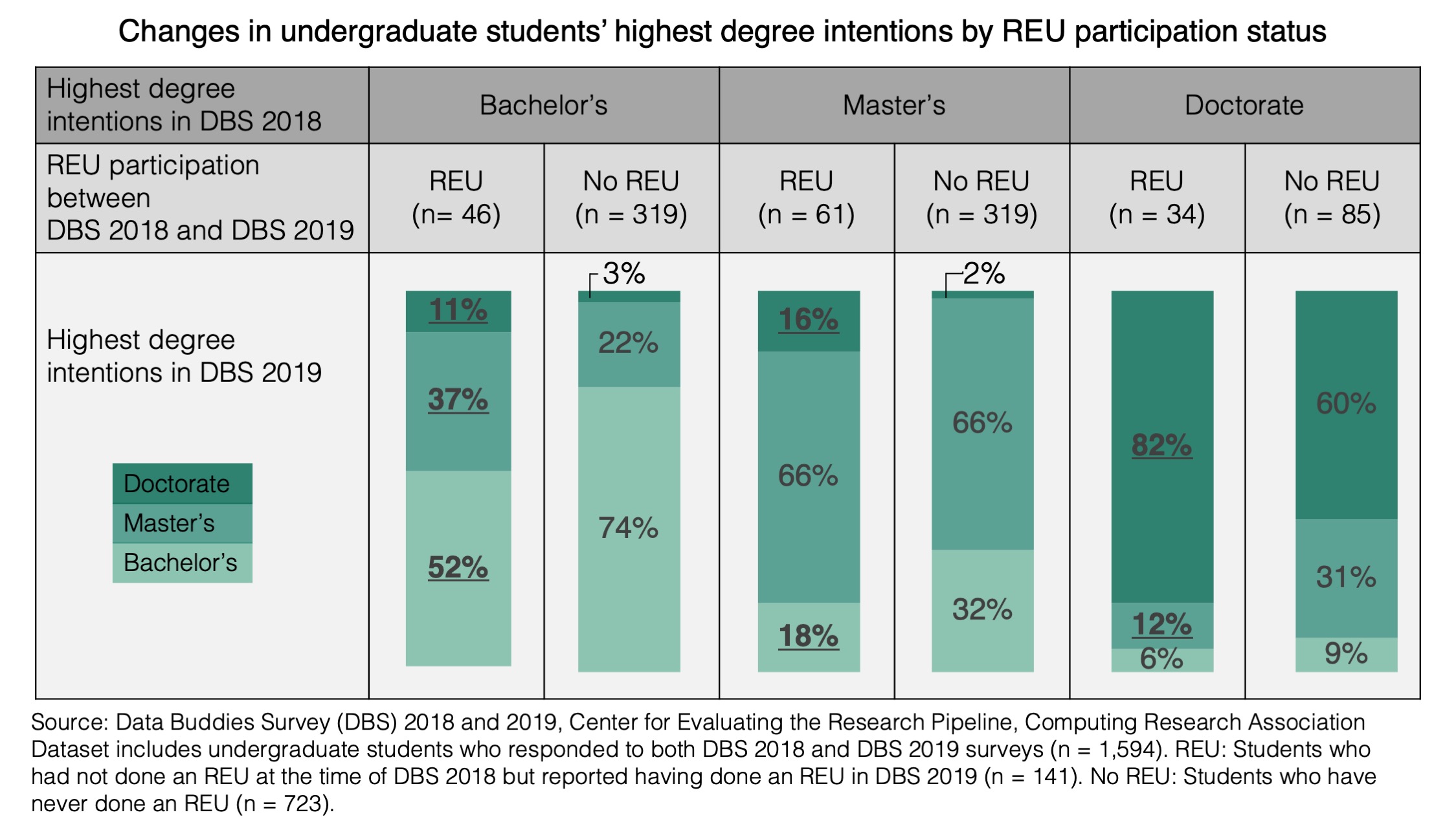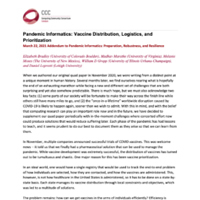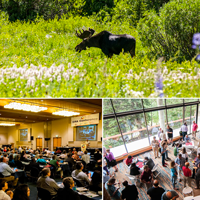REU Participation Encourages Students to Pursue Graduate Degrees

By Burçin Tamer, Director of CERP
Undergraduate research experiences have been considered an effective method of encouraging undergraduate students to attend graduate school. This analysis uses longitudinal data from the Data Buddies Survey (DBS) cohorts, specifically undergraduate students who responded to the survey in 2018 and 2019 (n = 1,594), to examine whether participation in an REU alters students’ intentions for the highest degree they plan to earn.
The graphic shows the highest degree plans of two groups of students: (1) Students who had not completed an REU at the time of DBS 2018 but reported having participated in an REU in DBS 2019 (n = 141), and (2) students who have never participated in an REU (n = 723). The results support the findings that REU participation encourages undergraduate students to go to graduate school.
The key observations from this analysis are two-fold:
- A larger percentage of the students who participated in an REU between the two surveys changed their highest intended degree to a higher-level degree (i.e., Bachelor’s to Master’s/Doctorate and Master’s to Doctorate) than the students who never participated in an REU.
- More students who participated in an REU continued to be interested in getting a graduate degree than those who did not participate in an REU. Conversely, without REU participation, a significant portion of the students changed their highest intended degree from Doctorate to Master’s and from Master’s to Bachelor’s.
Among students who participated in an REU 48% of those who wanted to get a Bachelor’s degree prior to participating in an REU changed their plans for the highest degree they would like to attain to a Master’s or Doctorate degree after participating in an REU. On the other hand, 74% of those who have never participated in an REU and wanted to get a Bachelor’s degree in 2018 still continue to plan on a Bachelor’s degree in 2019. Similarly, of the students who were interested in getting a Master’s degree in 2018 and participated in an REU, 16% became interested in getting a Doctoral degree after the REU participation, while only 2% of those who did not participate in an REU changed their plans in this way. Thirty two percent of the students who were intending on getting a Master’s degree and did not participate in an REU reported a Bachelor’s degree as their highest intended degree in 2019. Only 18% of the REU participants who were interested in a Master’s degree in 2018 decided to change their highest intended degree to a Bachelor’s degree. For the students who were interested in earning a Doctorate in 2018, REU participation helped maintain this intention in 82% of the cases while 40% of the students who did not participate in an REU change their intended highest degree to a Master’s or Bachelor’s degree.
Further examination of the effectiveness of various REU programs and how these programs impact the students’ career pathways will help the efforts to strengthen the computing research workforce. It is especially important to continue to tease out how these experiences impact students who are currently underrepresented in computing. CERP will be focusing on these questions as part of an NSF award to study the impact of REU participation on career pathways and an NSF contract to evaluate the CISE REU Program.
Notes:
- The survey data used in this graphic were collected during 2018 and 2019 survey cycles by CERP via the CRA Data Buddies Project.
- Two proportion t-tests were used to test the statistically significance of differences between the students who participated in an REU and those who did not in terms of their highest degree intentions in 2019 given their highest degree intentions in 2018.
 This analysis is brought to you by the CRA’s Center for Evaluating the Research Pipeline (CERP). CERP provides social science research and comparative evaluation for the computing community. Subscribe to the CERP newsletter here.
This analysis is brought to you by the CRA’s Center for Evaluating the Research Pipeline (CERP). CERP provides social science research and comparative evaluation for the computing community. Subscribe to the CERP newsletter here.
This material is based upon work supported by the National Science Foundation under grant numbers (CNS-1246649, CNS 1840724, DUE-1431112, and DUE 1821136). Any opinions, findings, and conclusions or recommendations expressed in this material are those of the author(s) and do not necessarily reflect the views of the National Science Foundation.



